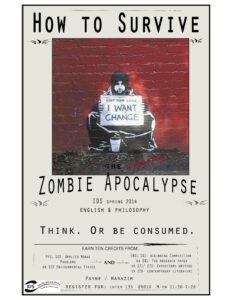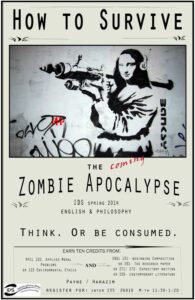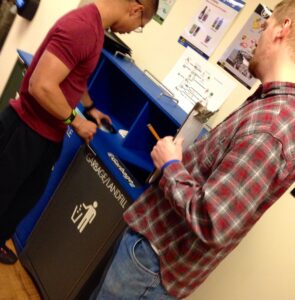
Most of us have seen Zombies popping up everywhere lately… in movies, TV shows and even football half-time Thriller dance mobs. It seems no matter where we turn, Zombies are on our minds.
But can Zombies teach us to be sustainable? Well apparently they can and the upcoming class INTER 135 How to Survive the Coming Zombie Apocalypse helps show how “leading lives that are both more sustainable and more fulfilling” is where we need to be headed to survive.
One of the course instructors, Elizabeth Harazim, described the course as the ethics bridge between equity and environment. Basically, to imagine your life in a real live disaster movie then think about how you are going to survive and get your basic needs met. From there it is only a short step to our modern society and who has resources, how they got them or more importantly, what they do with it that affects the rest of us.
 Zombies is being used as a metaphor for all that is not sustainable; but why? Well most of us know that Zombies are mindless eating machines, taking whatever is put in front of them and never caring what the consequences are, and certainly never caring about where their next meal is coming from or what it took to get it.
Zombies is being used as a metaphor for all that is not sustainable; but why? Well most of us know that Zombies are mindless eating machines, taking whatever is put in front of them and never caring what the consequences are, and certainly never caring about where their next meal is coming from or what it took to get it.
This metaphor sets up the course to touch upon disaster and survival scenarios that a Zombie Apocalypse could take but it won’t stop there. The basic needs of every human for food, shelter, water and resources is the same we encounter today without an apocalypse; so teaching self-sustainability and the ethics that enable us to have our needs met in today’s society are the lessons you can expect in case of a Zombie takeover.
INTER 135 is only being offered during spring quarters and is in succession of Bite Me 1 and Bite Me 2 as part of the IDS (Interdisciplinary Studies).
Another new class at Bellevue College that is teaching sustainability in an interesting way is called The Science of Sustainable Living. The course instructor, S. Roshni Tewari, taught what has been happening  around campus in this individual-responsibility based course. The course held two different field trips, one to the Hopelink Food Bank and the next to the Bullitt Foundation’s living building. Both trips helped demonstrate sustainable living patterns in our individual lives and within our society at large by touching on items like food distribution, equity and impact or food deserts and environmental building innovations.
around campus in this individual-responsibility based course. The course held two different field trips, one to the Hopelink Food Bank and the next to the Bullitt Foundation’s living building. Both trips helped demonstrate sustainable living patterns in our individual lives and within our society at large by touching on items like food distribution, equity and impact or food deserts and environmental building innovations.
One of the projects that you might have seen students participate in this quarter was the Office of Sustainability’s Composting Week. Both Composting Week and other engaging life-cycle projects in the course like “detox me,” where students list out all ingredients they expose their body to everyday, educated on sustainability and built a greater understanding of how to make better life choices; choices that sometimes effect more than just one person.
Both of these courses show the diversity of subjects within the theme of sustainability that are offered here at Bellevue College. While these courses are vastly different in their approach, everybody can appreciate learning how to live in more sustainable ways.
Your first tip might be… watch out for Zombies!
Last Updated April 8, 2014
